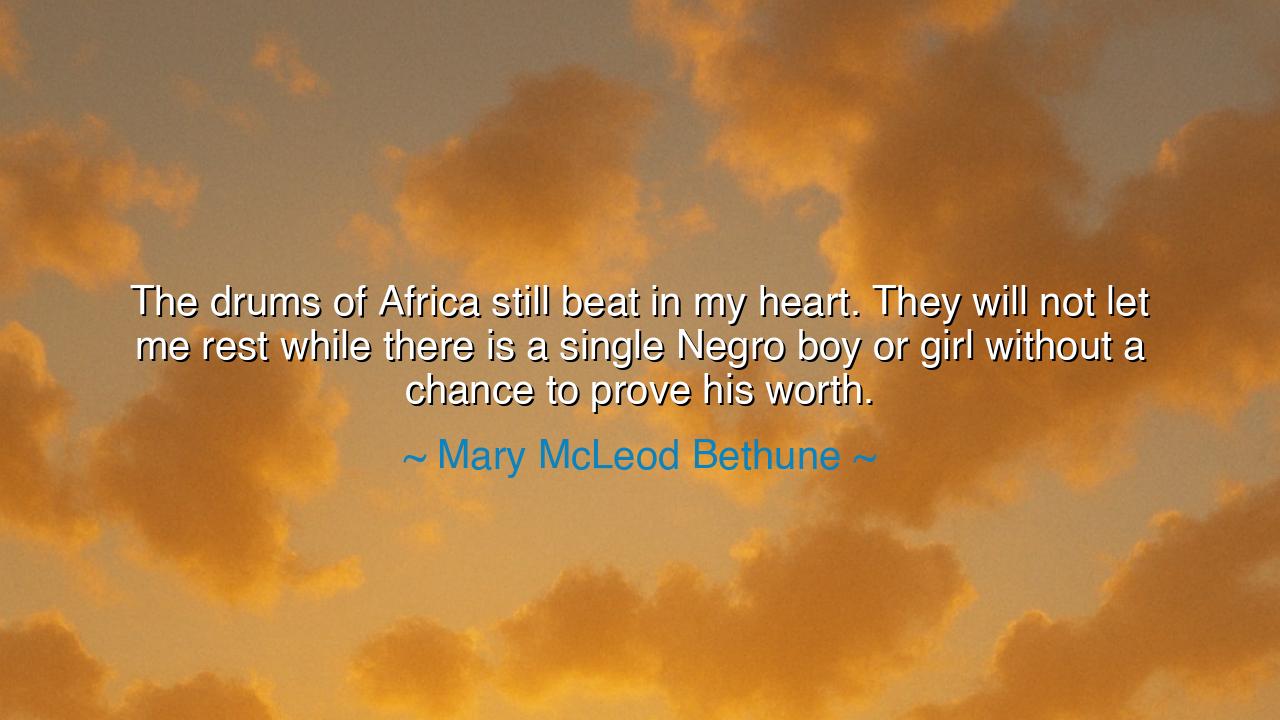
The drums of Africa still beat in my heart. They will not let me
The drums of Africa still beat in my heart. They will not let me rest while there is a single Negro boy or girl without a chance to prove his worth.






In the depths of the human spirit, there exists a call that is heard only by those who are bound by a deep sense of purpose and duty. Mary McLeod Bethune’s words, “The drums of Africa still beat in my heart. They will not let me rest while there is a single Negro boy or girl without a chance to prove his worth,” speak to the eternal resonance of this call, a call that reverberates through time and history. Bethune’s voice, echoing the rhythms of Africa, is the voice of those who have carried the weight of oppression and hope, and who continue to strive for the liberation and empowerment of their people. The “drums of Africa” are not mere sounds; they are the heartbeat of generations, pulsing with the memories of struggle and the promise of change.
Bethune’s words reflect the unwavering determination to uplift those who have been historically silenced, particularly the African-American youth who were denied the opportunity to prove their worth in a society that had long bound them by the shackles of racism and inequality. The metaphor of the drums is profound — in many African cultures, the drum is the vehicle of communication, carrying messages across vast distances, transcending the barriers of language. Just as the drum carries the collective voice of a people, so too does Bethune carry the voice of every oppressed soul, calling for action and change. Her determination to educate and empower reflects a deep-seated belief that the future of African Americans, and the broader human family, could only be shaped through the opportunity for education and self-expression.
The essence of Bethune’s resolve can be traced back to the ancient wisdom of those who have always fought for justice. Consider the ancient Greeks, whose ideals of democracy and equality were centered around the belief that every citizen should have the right to contribute to the welfare of the state. While these ideals were not always realized in practice, they represented the enduring belief that all human beings, regardless of their origin or status, should have the chance to prove their worth. Bethune, like the philosophers of old, understood that a society can only flourish when every individual has the opportunity to contribute, to rise above their circumstances, and to claim their rightful place in the world.
Bethune’s own life story mirrors this pursuit of equality and empowerment. Born to formerly enslaved parents in 1875, she was the 15th of 17 children, and her early life was marked by the challenges of poverty and racial discrimination. Yet, from an early age, she understood that education was the key to freedom and the tool for breaking the chains that held her and her people back. Despite the hardships she faced, Bethune went on to found the National Council of Negro Women, and the Bethune-Cookman University, where she dedicated her life to providing African American youth with the tools they needed to succeed and prove their worth. Her words were not mere aspirations; they were the result of a life dedicated to action and a deep understanding of the power of education.
Her tireless work to open the doors of education to African Americans echoes the struggles of countless others throughout history who have sought to tear down the walls that separate the privileged from the oppressed. Consider Booker T. Washington, a contemporary of Bethune, who also believed in the power of education as the key to African American advancement. Washington famously founded Tuskegee Institute, where he sought to equip young African Americans with the skills and knowledge needed to succeed in a society that often saw them as inferior. Washington, like Bethune, understood that true equality could only be achieved if African Americans were given the tools to prove their worth, not just in the eyes of society, but in their own eyes as well.
The lesson in Bethune’s words is one of unrelenting hope and dedication to the cause of education as a means of empowerment. As long as there is a single soul, whether in the United States or across the globe, who is denied the opportunity to learn and grow, the drums will continue to beat. The call to action is clear: it is not enough to simply hope for change — one must work relentlessly to make it happen. Bethune’s life teaches us that we must not allow circumstances or opposition to deter us from striving to create a world where all people have the opportunity to reach their fullest potential. The power of the individual, when nurtured and empowered, can transform societies and lift up entire generations.
In our own lives, we must ask ourselves: What are we doing to ensure that others — especially those who are marginalized — have the opportunity to prove their worth? Whether through education, mentorship, or advocacy, we must continue the work that Bethune began. Her call to action is timeless: the drums of Africa still beat, not only for those who lived in her time but for us today. Let us be the ones who answer their call, who rise up with the same determination, the same vision, and the same commitment to ensuring that no soul is left behind in the quest for dignity and equality. Let us teach, let us uplift, and let us stand united in the belief that every individual has the right to prove their worth.






AAdministratorAdministrator
Welcome, honored guests. Please leave a comment, we will respond soon